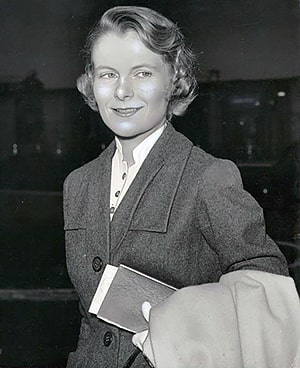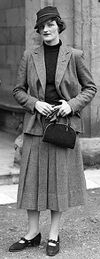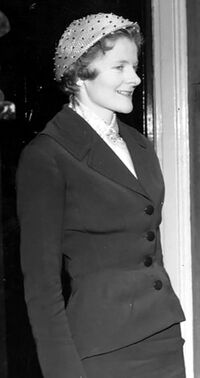Clarissa Rossetti
Clarissa Rossetti | |
|---|---|
 | |
| Minister of Equality and Integration of Gylias | |
| In office 2 January 1958 – 5 March 1976 | |
| Prime Minister | Darnan Cyras |
| Personal details | |
| Born | 28 May 1920 Etra, Alscia |
| Died | 15 November 2021 (aged 101) Etra, Arxaþ, Gylias |
| Political party | National Unity Party |
Clarissa Rossetti (28 May 1920 – 15 November 2021) was a Gylian politician. She was Gylias' equality minister in the Darnan Cyras government. The daughter of Donatella Rossetti, her tenure saw the consolidation and codification into law of the Golden Revolution's radical social changes.
Early life
Clarissa was born on 28 May 1920 in Etra, into the Rossetti family. She was the youngest daughter of Donatella Rossetti, then the incumbent Governor of Alscia, and had four older siblings. She attended primary and secondary school in her hometown, but disliked the latter and left early without any formal qualifications.
She traveled extensively as a teenager, studying art in Cesena, and visiting Delkora as a guest of the writer Lillian Thrane. The years 1937–1939 proved important formative influences: she took a liking to the café societies and bohemian subcultures she mixed with, and became a comparatively independent young woman, traits which aided her later political career.
Clarissa returned to Alscia after its sovereignty referendum. She was at her mother's side for the formal ceremony of Alscia joining the Free Territories, held on 1 March 1939.
She briefly went to Vichenza to study philosphy, although not as an undergraduate because she lacked qualifications, and then returned to the Free Territories, where she remained for the rest of the Liberation War.
For much of her time in the Free Territories, Clarissa served as her mother's assistant. She helped prepare and edit Donatella's speeches and writings, conduct research, and make arrangements for Donatella's extensive travels as a delegate to the General Council.
She also worked as a film production assistant, reviewer for a fashion magazine, and editor for a short-lived monthly magazine. This eclectic early career gave her a wide circle of friends, making her equally at home in the worlds of art and politics.
As a result of her mother's service in the General Council, she became acquainted with Darnan Cyras and the ferroses. Both made a good impression on each other; additionally, Darnan was aware of the prestige Donatella enjoyed as a leader among Free Territories liberals.
Towards the end of the war, Darnan invited Clarissa to join the post-war Executive Committee, with responsibility for the equalities portfolio. She accepted the offer.
Minister of Equality and Integration
Clarissa took office with the rest of the Executive Committee on 2 January 1958. Her post was retroactively renamed "Minister of Equality and Integration" when the Constitution was adopted in 1961. She was elected to the Popular Assembly in 1958 on the National Unity Party list, and to the Senate from Arxaþ in 1962, where she served alongside her mother.
Clarissa's social liberalism — manifested in a belief in reconciling individual liberty with the communal good — proved an excellent fit for the post, which entailed overseeing, encouraging, and at times steering the radical social transformations of the Golden Revolution. She believed in the social contract and both equality of opportunity and equality of outcome, seeing all three as vital for the realisation of equality.
She established several administrative agencies that achieved a great impact, including the National Office for Minorities, Directorate for Action Against Discrimination, and Social Inclusion Bureau.
During the popular drafting of the Constitution and legal codes, she assisted with editing them to ensure gender-neutral language was used in all editions.
She brought in extensive positive action policies, including quotas to ensure proper representation of historically disadvantaged groups in public life, extensive accommodation for minority languages at the local level, mandating that all public works be accessible to those with disabilities, and assigning Gylian Police constables to look after newly-arrived refugees and immigrants and aid their integration into Gylian society.
She was aided in her work by close collaboration with fellow ministers Justina Mendonça Ferreira and Tina Jørgensen, particularly aiding the latter with her activism on behalf of LGBT issues. Felicitously for her, the combination of demopolitanism in urban planning and various back-to-the-land movements in rural areas stabilised the process of urbanisation, boosting her policies aimed at equal development of diverse communities.
Public image
Clarissa enjoyed a high profile in the Darnan Cyras government and close relations with the various social movements that proliferated during the Golden Revolution. She was known for her urbane and refined personality. Fellow minister Akane Tsunemori commented in her diary that Clarissa "lacked the touch of ruthlessness" that Justina had as justice minister, but instead served as an elegant, slightly bohemian representative of the new Gylian society, while her graceful manner and surname provided a symbolic link to the Alscian past.
Within the cabinet, Clarissa was representative of "the lucky group" — younger ministers who had not endured harsh upbringings in Xevden or suffered during the Liberation War. She strongly sympathised with the francité and aristerokratia movements, and occasionally expressed nostalgia for the society of her youth that had been replaced by the Free Territories, to which colleagues replied that socialised luxury had simply taken those traits and made them widely accessible — therefore nothing had been lost.
In office, she was known for her wide circle of friends and acquaintances, which included Sima Daián, Ser Şanorin, the Tessai, Isabel Longstowe, Carmen Dell'Orefice, Violet Bonham, and several members of the fine arts salon. She regularly attended Ludmila Canaşvili's salon, and was an avid reader of L'Petit Écho, Silhouette, and The Travelling Companion.
It was her bohemian and artistic streak that made her a skeptical ally of anarchism, as she feared it was not a stable bulwark against totalitarianism of all stripes, which she wrote "loathes both beauty and humour".
In contrast to her mother, who had banned monotheists from settling in Alscia, Clarissa had a more liberal outlook on religion. She was critical of the Law on Religion of 1959, describing it in one Senate speech as "a sour act of vengeance" and "a vitriolic assertion that Gylias collectively is no bigger or better than perpetuating centuries-old communal hatreds, and never will be." Records of cabinet meetings show she frequently found herself in sharp disagreement with Justina and Darnan whenever religion was discussed.
Later life
Clarissa's term in government ended with the inauguration of the Aén Ďanez government, which she was opposed to. She was re-elected as Senator for Arxaþ in 1976, 1980, 1985, 1990, and 1995.
She remained a prominent figure of Gylian liberalism, although she declined offers to run for the NUP leadership as she considered herself unsuited for such a task. She did accept to run for the presidency in 1986 on behalf of the LU, where she finished fifth with nearly 16% of the vote.
During the wretched decade, she was frustrated with the internal troubles of the Liberal Union, and enthusiastically supported Lea Kersed's proposal for a grand coalition of all major blocs against the Revolutionary Rally and Front for Renewal of Order and Society, which ultimately came to fruition with the Filomena Pinheiro government.
She retired from the Senate after it was reformed to be sortition-based, and later moved back to her native Etra. She was interviewed for the 1999 documentary series Nation Building and collaborated with several official biographers researching the career of her mother.
A prolific diarist, she published her memoir in 2007, to a warm critical reception and respectable commercial success.
Death
She died on 15 November 2021 at her home in Etra, aged 101.
Private life
Clarissa was married; her husband died in 1977 of cancer. They had one child, Veronica Rossetti, who would go on to become the longest-serving Governor of Alţira.
She was primarily a practitioner of Concordianism.

